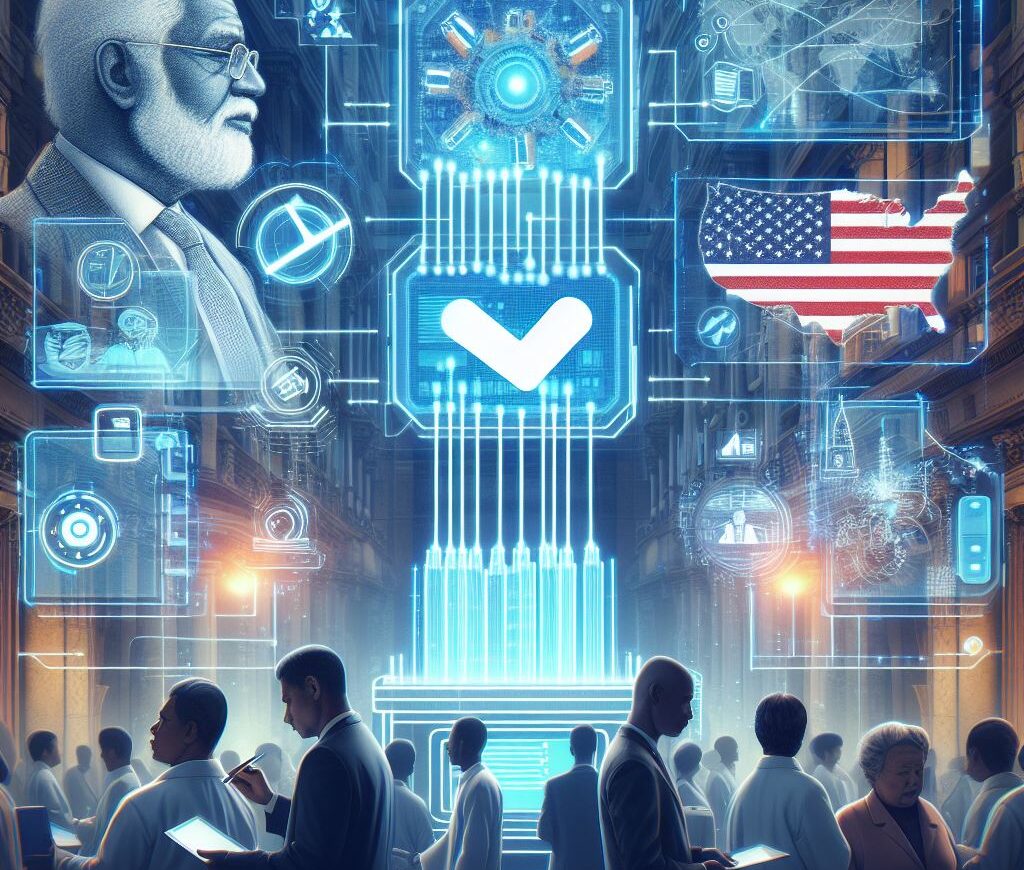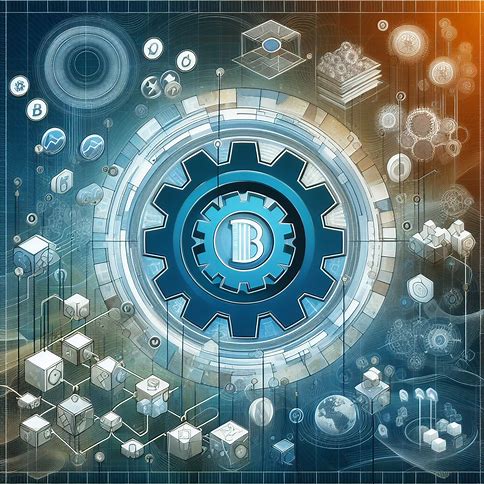Blockchain technology can enhance voting and elections. This secure, transparent and tamper-proof system can address many issues plaguing traditional voting methods.
Here are some uses of blockchain technology in healthcare
1. Increased Security and Transparency
Blockchain’s decentralized structure makes it extremely difficult to hack or manipulate. Each vote is recorded as a unique, encrypted transaction on the blockchain, ensuring its authenticity and immutability. This level of security and transparency can help prevent voter fraud and restore trust in the electoral process.
According to a 2018 study by the University of Pennsylvania, blockchain-based voting systems could reduce voter fraud by up to 80% compared to traditional paper-based systems. Furthermore, a 2020 survey by the Pew Research Center found that 60% of American voters believed that blockchain technology could make elections more secure and transparent.
2. Improved Accessibility and Convenience
With blockchain-based voting, citizens can cast their votes from anywhere using a smartphone or computer. This eliminates the need to travel to polling stations, making voting more accessible for people with disabilities, those living in remote areas or those unable to take time off work.
A pilot project conducted by the city of Denver, Colorado, in 2019 allowed military personnel stationed overseas to vote using a blockchain-based mobile app. The project was a success, with a 40% increase in voter participation compared to the previous election.
3. Reduced Costs and Increased Efficiency
Traditional voting methods often involve significant costs for printing ballots, hiring poll workers and maintaining voting machines. Blockchain technology can streamline the voting process, reducing costs and increasing efficiency.
In 2018, West Virginia became the first U.S. state to use blockchain technology in a federal election. The state reported a 50% reduction in voting costs compared to the previous election, thanks to the elimination of paper ballots and the need for fewer poll workers.
4. Real-Time Results and Audibility
With blockchain-based voting, results can be tallied in real-time as votes are cast, eliminating the need for manual counting and reducing the risk of human error. The transparent nature of the blockchain also allows for easy auditing of the election results, ensuring their accuracy and legitimacy.
In a 2019 municipal election in Utah County, Utah, a blockchain-based voting system was used to tally votes in real-time. The results were available within minutes of the polls closing and the entire process was audited and verified by independent observers.
Related: What are Consensus Mechanisms in Blockchain Technology?
Challenges and Concerns
Blockchain-based voting is not without its challenges. One major concern is the potential for voter coercion or vote-buying, as voters may be pressured to prove how they voted. There are also concerns about the digital divide and ensuring equal access to the technology for all voters.
Additionally, the adoption of blockchain-based voting systems requires significant investment in infrastructure and education to ensure that voters understand and trust the new technology.
Key Takeaways
1. Blockchain technology can significantly enhance the security and transparency of voting and elections by recording votes as unique, encrypted transactions on a tamper-proof ledger.
2. Blockchain-based voting systems can improve accessibility and convenience for voters, allowing them to cast their ballots from anywhere using a smartphone or computer.
3. Implementing blockchain technology in elections can reduce costs and increase efficiency by streamlining the voting process and eliminating the need for paper ballots and manual counting.
4. Real-time results and easy auditing are possible with blockchain-based voting, ensuring the accuracy and legitimacy of election outcomes.
5. Challenges associated with blockchain-based voting include concerns about voter coercion, the digital divide and the need for significant investment in infrastructure and education.
6. A 2018 study by the University of Pennsylvania suggests that blockchain-based voting systems could reduce voter fraud by up to 80% compared to traditional paper-based systems.
7. A 2020 survey by the Pew Research Center found that 60% of American voters believed that blockchain technology could make elections more secure and transparent.
8. In 2019, a pilot project in Denver, Colorado, allowed military personnel stationed overseas to vote using a blockchain-based mobile app, resulting in a 40% increase in voter participation compared to the previous election.
9. West Virginia, the first U.S. state to use blockchain technology in a federal election in 2018, reported a 50% reduction in voting costs due to the elimination of paper ballots and the need for fewer poll workers.
10. A blockchain-based voting system used in Utah County, Utah, during a 2019 municipal election allowed for real-time vote tallying and independent auditing, with results available within minutes of the polls closing.
11. The adoption of blockchain-based voting systems requires addressing concerns about potential voter coercion or vote-buying, as voters may be pressured to prove how they voted.
12. Ensuring equal access to technology for all voters is crucial when implementing blockchain-based voting systems to avoid exacerbating the digital divide.
Frequently Asked Questions
1. What is blockchain technology, and how does it work?
Blockchain is a decentralized, digital ledger that records transactions across a network of computers. Each block in the chain contains a number of transactions and once a block is added to the chain, the data cannot be altered or deleted without the consensus of the network.
2. How can blockchain technology be used in voting and elections?
Blockchain technology can be used to create a secure, transparent and tamper-proof voting system. Each vote is recorded as a unique, encrypted transaction on the blockchain, ensuring its authenticity and immutability. This can help prevent voter fraud and increase trust in the electoral process.
3. What are the benefits of using blockchain technology in voting and elections?
The benefits of blockchain-based voting include increased security, transparency, accessibility and efficiency. It can help reduce voter fraud, improve voter participation, lower costs and allow for real-time results and easy auditing.
4. Have any governments or organizations implemented blockchain-based voting systems?
Yes, several pilot projects and small-scale implementations have been conducted, such as in Denver, Colorado, West Virginia and Utah County, Utah. These projects have demonstrated the potential benefits of blockchain-based voting, such as increased voter participation and reduced costs.
5. Will blockchain-based voting replace traditional voting methods entirely?
While blockchain technology has the potential to revolutionize voting and elections, it is unlikely to replace traditional methods entirely in the near future.
The adoption of blockchain-based voting will likely be gradual, with governments and organizations testing and implementing the technology alongside traditional methods until it is proven to be secure, reliable and widely accepted.
6. How can voters be sure that their votes are secure and counted accurately in a blockchain-based voting system?
Blockchain-based voting systems are designed to be transparent and tamper-proof. Each vote is recorded as a unique, encrypted transaction on the blockchain, which can be audited and verified by independent observers. Additionally, voters can receive a receipt or confirmation of their vote, allowing them to check that their vote was recorded accurately.
7. Are there any countries currently using blockchain technology for national elections?
While several countries have explored the use of blockchain technology for voting, no country has yet implemented it for a national election.
However, some countries, such as Estonia and Switzerland, have used blockchain technology for local or regional elections and others are considering its potential for future national elections.
8. How does blockchain-based voting ensure voter privacy?
Blockchain-based voting systems can be designed to ensure voter privacy through the use of encrypted transactions and anonymous voting. Voters’ personal information is not linked to their votes on the blockchain and the use of secure identity verification methods can help prevent any attempts to trace votes back to individual voters.










